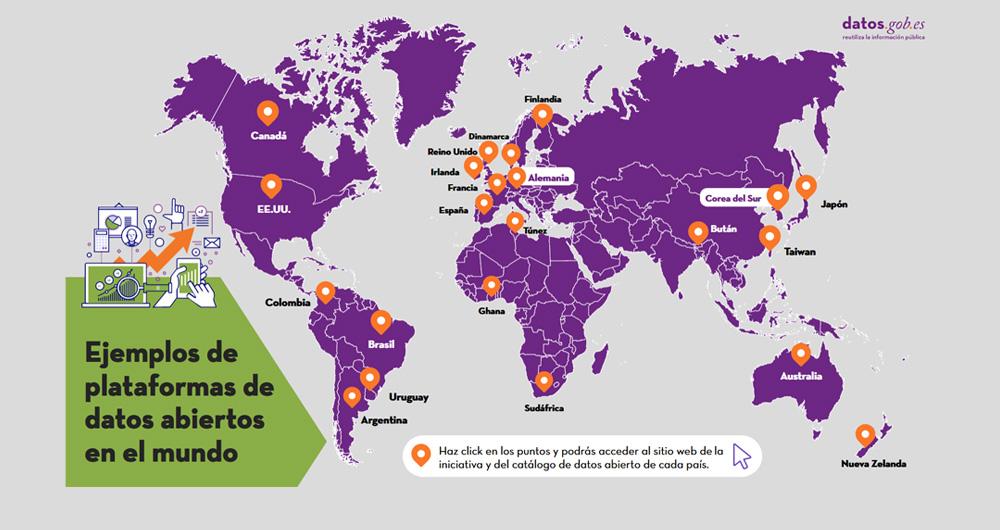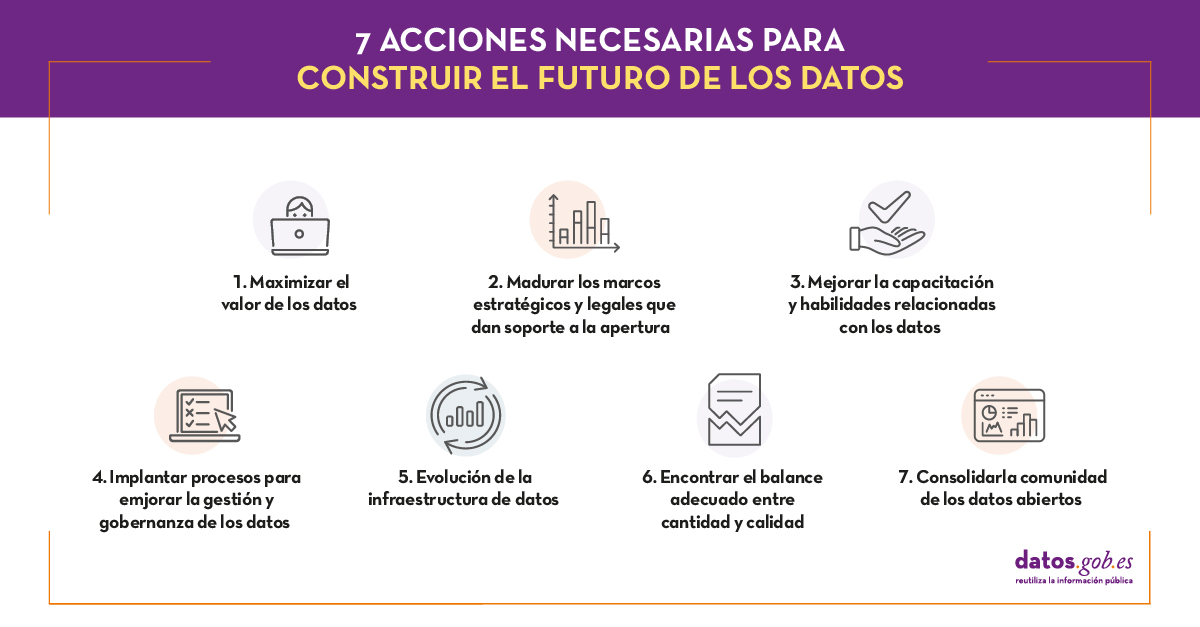
In view of the series of current and future trends around the future of open data indicated in our report, we wanted to check to what extent these - or similar - trends are already present in the global open data community. To this end, we have verified the current activities and future plans of several countries through documentation available from various sources such as thel Open Government Partnership, the OECD, the Latin American Open Data Initiative, the International Open Data Charter, the African Open Data Network (AODN), the Open Data Policy Lab and the official national open data initiatives themselves. You can access the open data platforms of the portals analysed through the following infographic.
What we have found confirms the report's observations and also includes other associated trends such as the redesign of open data platforms; the increasing availability of open data on natural resources and climate change; the new and relevant role of data in health crises; the growing use of open data in the fight against corruption; the promotion of open science; the publication of data of particular social relevance; the increased sensitivity to the need for disaggregated and gender-sensitive data; or the growth of open data at the regional and local level. Below, we will review some of the examples of each of these trends that we have found around the world:
America
- Canada: The government is currently working on improving its open.canada.ca open data portal to make it more user-friendly, facilitate searches, and encourage interaction and collaboration among community members - for example, through new data use stories. In addition, the government is also making a firm commitment to open science, including among other measures the creation of a new open science data portal that is expected to be improved and expanded over time.
- Mexico: after a long history as a leader in open data in the region, its efforts have recently focused on improving access to information with two main objectives: to make life easier for its citizens and to increase the level of public scrutiny. To this end, Mexico is developing programs to improve access to data and information related to key issues such as education, public spending on social development, anti-corruption, natural resource management or corporate beneficiary records.
- Brazil: having completed its new data openness reference model and the control panel for monitoring data openness, current efforts are mainly focused on fostering an active ecosystem around data to promote the effective use of data - as this has been the main barrier identified in achieving a higher level of reuse and innovation. However, there are also other initiatives underway to improve data availability in some key areas such as property registration or transportation.
- United States: the country has recently implemented a new federal data strategy whose main objectives include improving the capabilities and knowledge of data in the administration in order to be able to use this input regularly as a decision-making tool. Thus, its most recent action plan focuses on the development of communities of practice and shared solutions. Other measures include the incorporation of a Chief Data Officer (CDO) in a total of 24 agencies and departments; the creation of a federal council in which all of them participate; or the strengthening of the publication of health data with the aim of responding to the most pressing public health challenges of today, including the pandemic or the crisis surrounding the indiscriminate use of opioids.
- Colombia: its most recent commitment to purposeful open data is clearly focused on data to fight corruption: of the 93 datasets listed in its roadmap, one third are related to the Inter-American PIDA Program for the fight against corruption. The other current focus within the strategy is on promoting open data at the sub-national level, with simultaneous actions in Palmira, Yumbo, Cali, Boyacá and Valle del Cauca.
- Uruguay: perhaps the most outstanding recent action may be its pilot experience in the implementation of the openness guide for action against climate change in collaboration with the International Open Data Charter. However, the country also currently has an ambitious open data agenda that includes actions as varied as the complete renovation of its data portal, improvements in the availability of cadastral data and budget transparency or increasing the visibility of data on gender violence. It is therefore not surprising that the country leads the latest edition of the Regional Open Data Barometer.
- Argentina: at the technical and data governance level, it is worth highlighting the progress made in the implementation of its data as a service policy, designed to achieve a high level of quality and interoperability of data published by design. Regarding improvements in data availability, efforts are lately focused on areas such as transparency in public spending, procurement and extractive industries (through the implementation of GIFT, OCDS and EITI standards respectively).
Asia and Oceania
- South Korea: its current open data agenda is focused on increasing the use cases of data by working more closely with companies and research centers. This will be guided by its new data release strategy (part of the Korean New Deal) which focuses on the release of certain data of high value and interest to industry, such as autonomous driving, smart cities and healthcare.
- Japan: in response to the apparent low level of digital preparedness for events such as the current pandemic, the government recently decided to create the Digital Agency, a cross-cutting agency that is now in charge of the also new national data strategy. This strategy is distinguished by its particular citizen-centric and trust-centric vision, whereby data is seen as the basis for all social and industrial activities and the government functions as a platform to serve them.
- Taiwan: the Taiwanese government's current focus is on collaboration through data - the main exponent of which was seen through the government's exemplary response to the pandemic crisis through the correct use of data - working alongside the other actors in the community, not only in its exploitation, but also in understanding the challenges faced by those trying to use it and what skills they will need to develop in order to do so.
- Australia: in addition to continuing its efforts in the open publication of procurement data, the activities of the national open data initiative are lately focused on the implementation of the Data Transparency and Availability Act -guided by the National Data Commissioner- and the commitment to improve the skills of participation and collaboration in the design of public services, which is already beginning to manifest itself through actions such as communities of practice or the new pilot program of data inventory with a focus on the needs of the people.
- New Zealand: the country has just launched the update of its government data strategy and roadmap, whose main objectives are the publication of data with purpose, the promotion of good practices and new internal capabilities, the creation of effective partnerships and collaborations, and transparency in governance practices and data openness. This new strategy is also accompanied by other improvements in the usability of the data portal and mandatory data standards.
Europe
- United Kingdom: The latest significant milestone in the UK government's long-running open data journey has been the new reform of the national data strategy to stimulate economic growth and innovation while strengthening trust in public data. This change of direction will be guided by the Center for Data Ethics and Innovation (CDEI), whose two-year plan currently underway envisages as its main objectives maximizing public benefit through data and building a consistent artificial intelligence ecosystem that can give rise to transformative projects.
- France: true to its role as one of the leaders of the open data movement in the world, the French government is undertaking one of the biggest transformations underway today through its FranceConnect platform, which use will be mandatory for all public authorities from 2022, thus giving rise to what could be the first native platform for the opening and reuse of public administration information. In the meantime, it also continues to work tirelessly on continuously improving its current strengths, including expanding its team, gradually improving the open data portal, collaborating with other actors and expanding local openness initiatives.
- Germany: developments in the German open data agenda include mainly two key actions in the near future. On the one hand, the evolution towards an information platform for government data (known as VIP) whose objective will be to function as a central hub to facilitate the findability of data and verify its quality, although without actually hosting it directly. On the other hand, regular meetings in different formats will be encouraged to facilitate the exchange of knowledge and experiences between different actors.
- Ireland: the government continues to be immersed in the implementation of its 2017-2022 open data strategy whose main objective is to expand the amount of reusable data available while creating connections with the reuser community to promote the economic and social benefits of data. This strategy has subsequently been complemented by the public service data strategy that positions open data as a central element of public data management and governance.
- Denmark: despite being a particular case in the open data universe with its municipal and regional open data catalog as the main reference and a national data catalog that is out of the usual standards, this has not been an impediment to the continuous advancement of its open data strategy that currently has as its main focus the publication of data on natural resources and climate - which is perfectly reflected in the openness activity at the regional and local level. The recent report on the value of open data in municipalities is another reflection of the prominence of openness at the sub-national level in the country.
- Finland: three main actions are on its national open data agenda - (1) the development of standardized interfaces to facilitate self-discovery of new datasets, (2) the establishment of new quality criteria to facilitate reuse, and (3) the development of guidelines for the ethical use of data in artificial intelligence.
Africa
- South Africa: Data openness activity continues to make modest progress and the government's intentions are currently focused on fiscal and corporate beneficial ownership transparency. At the same time, a need has been identified to work with potential data intermediaries to improve their usability when applying data to their own context, thereby improving the potential for data reuse and impact.
- Ghana: following the re-launch of its open data initiative - in which special emphasis was placed on training public workers - the government's efforts are now focused on facilitating access to information related to transparency and anti-corruption with ambitious plans to publish data on parliamentary activity, asset declarations, company beneficiaries, oil sales and public investment.
- Tunisia: the government started the year with the publication of a new decree on public open data that aims to lay the groundwork for the renewal of its open data catalog to adapt it to current standards of data collection and classification, and the development of data inventories in strategic sectors such as health, education or justice.
In short, the open data movement continues to advance worldwide, focused not only on publishing data but also on extracting its maximum value. This is reflected in our country.
In our case, a series of relevant milestones coincide in time, among which we can highlight the new Digital Spain and Open Government plans, the Digital Education and Digital Skills action plans, the creation of the figure of the Chief Data Officer or the new Strategic Data Office. Their combination may result in a key turning point in taking the national open data initiative to the next level.
Content prepared by Carlos Iglesias, Open data Researcher and consultant, World Wide Web Foundation.
The contents and views expressed in this publication are the sole responsibility of the author.


